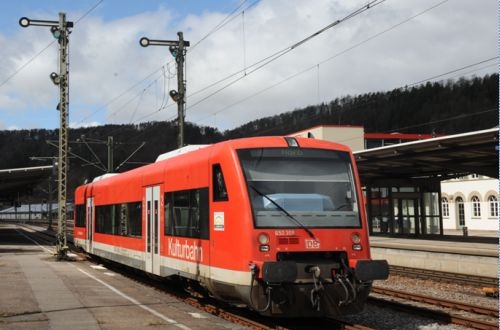Network 2 concerns services in the Stuttgart, Ulm and Bodensee lake area amounting to 2,814,000 train-km annually, of which about 100,000 train-km is in the neighbouring state of Bavaria. The winner of the seven-year concession will take over operation of these services in December 2016.
The Stuttgart - Ulm line is electrified, whereas the Lindau - Friedrichshafen - Ulm line is still diesel operated, but might be electrified during the concession. Bidders will be allowed to make use of existing rolling stock.
Network 3 covers train services in the Gäu, Murr, and Mittelfranken region and the 13-year contract will start in December 2018. Network 3 amounts to 3,465,000 train-km annually, of which 545,000 train-km is in Bavaria, and comprises two non-electrified routes:
- Stuttgart - Schwäbisch Hall - Hessental - Crailsheim - Nuremberg, and
- Stuttgart - Eurtingen im Gäu - Freudenstadt/Konstanz.
Services must be operated with new rolling stock, and the tendering authority is willing to help finance the new vehicles. There are three options for financing these vehicles:
- Classic model: the concessionaire will procure and operate the trains itself.
- Financing using the "Baden-Württemberg" model: the concessionaire orders and purchases the trains directly from the manufacturer, however, after delivery, transfers them to a Special Purpose Vehicle set up specifically by the Baden-Württemberg administration which will arrange a bank loan and then lease the trains back to the operator.
- Capital Service Guarantee (KDG) model: the concessionaire orders the rail vehicles in cooperation with an EU-based leasing company which will purchase them. With this model, the concessionaire is obliged to make a joint bid for the regional train services together with the leasing company and a bank.
Network 5 covers the Donau - Ostalb area and comprises the following lines:
- Ulm - Aalen
- Neustadt (Black Forrest) - Donaueschingen - Sigmaringen - Ulm
- Neustadt (Black Forrest) - Rottweil
- Stuttgart - Tübingen - Aulendorf
- Tübingen - Horb, and
- Basle Bad - Singen Hohentwiel - Friedrichhafen - Ulm/Lindau.
The 10-year contract will come into effect in December 2016 and comprises 6.6 million train-km annually, of which 600,000km is in Bavaria.

